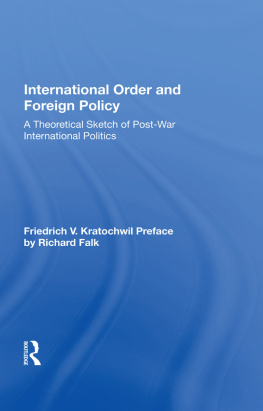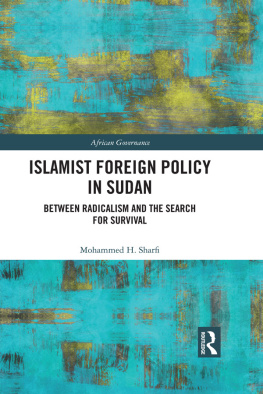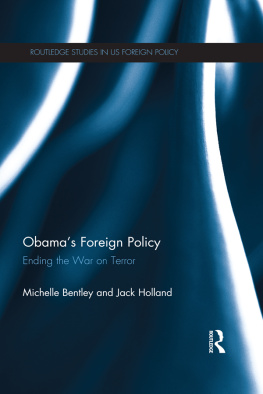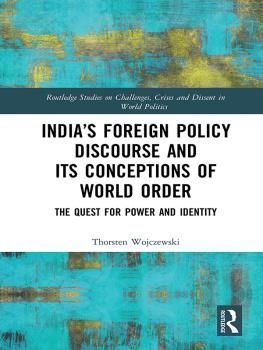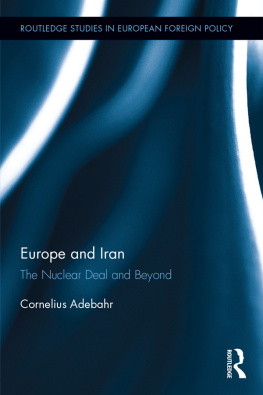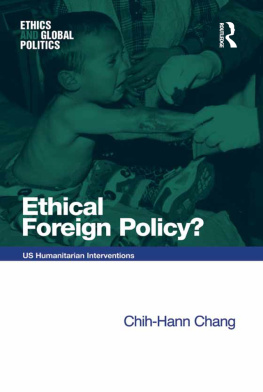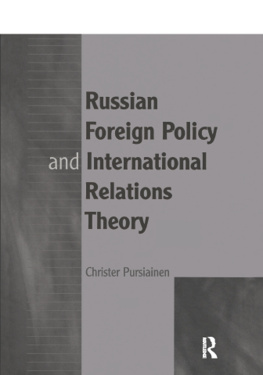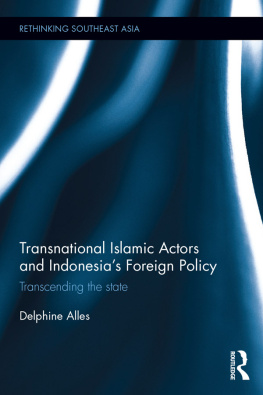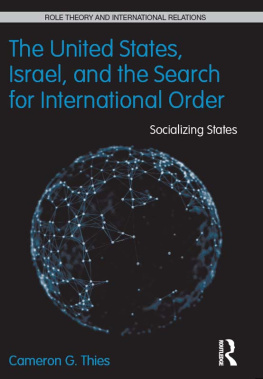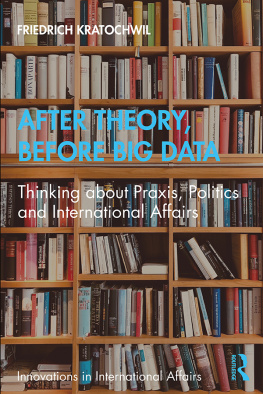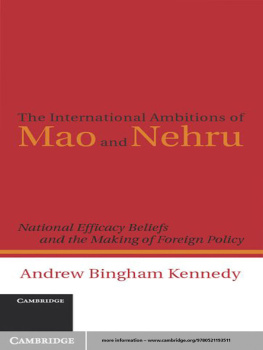International Order and Foreign Policy
Westview Replica Editions
This book is a Westview Replica Edition. The concept of Replica Editions is a response to the crisis in academic and informational publishing. Library budgets for books have been severely curtailed; economic pressures on the university presses and the few private publishing companies primarily interested in scholarly manuscripts have severely limited the capacity of the industry to properly serve the academic and research communities. Many manuscripts dealing with important subjects, often representing the highest level of scholarship, are today not economically viable publishing projects. Or, if they are accepted for publication, they are often subject to lead times ranging from one to three years. Scholars are understandably frustrated when they realize that their first-class research cannot be published within a reasonable time frame, if at all.
Westview Replica Editions seem to us one feasible and practical solution to the crisis. The concept is simple. We accept a manuscript in camera-ready form and move it immediately into the production process. The responsibility for textual and copy editing lies with the author or sponsoring organization. If necessary we will advise the author on proper preparation of footnotes and bibliography. The manuscript is acceptable as typed for a thesis or dissertation or prepared in any other clearly organized and readable way, though we prefer it typed according to our specifications. The end result is a book produced by lithography and bound in hard covers. Edition sizes range from 200 to 600 copies. We will include among Westview Replica Editions only works of outstanding scholarly quality or of great informational value and we will exercise our usual editorial standards and quality control.
International Order and Foreign Policy: A Theoretical Sketch of Post-War International Politics
Friedrich V. Kratochwil
The author develops a new perspective for the study of problems of international order by drawing on and integrating insights from game theory, social psychology, hermeneutics, and language philosophy. His case study is the rise and demise of the Cold War. This newly developed approach not only allows a critical evaluation of the contending arguments of revisionist and traditionalist historiography, but also facilitates the raising of more normatively oriented questions and enhances our understanding of conflict in connection with the investigation of the present international order.
Friedrich V. Kratochwil, assistant professor of political science at the University of Maryland, Baltimore County, received his Ph.D. in international relations from Princeton University. The present work was written under the auspices of the former University Consortium of World Order Studies and was furthered by a fellowship grant from the Konrad Adenauer Foundation of Germany.
. , .
It is the most hateful of sorrows afflicting mankind to have knowledge of so much and power over nothing.
Herodotus. Histories. Bk. IX, 16.
First published 1978 by Westview Press
Published 2018 by Routledge
52 Vanderbilt Avenue, New York, NY 10017
2 Park Square, Milton Park, Abingdon, Oxon OX14 4RN
Routledge is an imprint of the Taylor & Francis Group, an informa business
Copyright 1978 by Taylor & Francis
All rights reserved. No part of this book may be reprinted or reproduced or utilised in any form or by any electronic, mechanical, or other means, now known or hereafter invented, including photocopying and recording, or in any information storage or retrieval system, without permission in writing from the publishers.
Notice:
Product or corporate names may be trademarks or registered trademarks, and are used only for identification and explanation without intent to infringe.
Library of Congress card number: 77-94107
ISBN: 0-89158-065-4
ISBN 13: 978-0-367-02070-5 (hbk)
by Richard Falk
It is surprising how little literature in international relations withstands the test of time. Sometimes it seems not only as if Thucydides, Machiavelli, and Hobbes established a dominant tradition of inquiry, but long ago managed to write virtually everything that it is possible to know about the subject. This dominant tradition of speculation has emphasized the realities of a world in which political actors engage in rivalries that are resolved by diplomatic manipulation if possible, by open warfare if necessary. There is no pretention that a system of humane governance is possible on a global scale. Appearance to the contrary, the League of Nations and the United Nations are extensions of the state system rather than alternatives to it, providing a convenient forum for discussion without posing any threat to the predominance of the sovereign state. The outcome of international conflict remains ultimately a test of statist wills and capabilities. Might makes right. Peace treaties sanctify the fruits of aggression. Prudence and self-restraint are as close as diplomacy comes to morality.
The Marxist analysis of international relations, especially through its interpretation of imperialism, has added a dimension to this realist tradition. The revolutionary outlook of Marxist thought is, indeed, the one optimistic view of global reform that continues to be taken seriously. In many parts of the world, Marxism rests its internal case on the conviction that the socialist transformation of national societies will automatically produce a harmonious global society constituted by a community of socialist states. So far, historical experience defies theoretical expectations. In practice, national interests have proven more decisive than ideological affinity, as strained relations within the socialist sector of world society suggest. And so, except for the most dogmatic adherents of the faith, Marxism-Leninism does not provide a credible path to a peaceful world system.
Among non-Marxists, those who insist that drastic global reform is possible and necessary are scorned or simply ignored, dismissed as idealists, or Utopians, treated as victims of illusion who would actually be dangerous if ever given access to power because of their failure to grasp the play of forces at work in international life. This cynical consensus has not been dissipated in the nuclear age. It is generally accurate even for those heads of state who constantly proclaim their aspirations for peace and justice. It includes even those leaders who announce that the time has come to supplant balance of power politics by world order politics, yet act as if geopolitics as usual were the only viable option.
The value-laden rhetoric used by statesmen may express the sentiments of a given leader with sincerity. Such leaders are, however, without much freedom of action. A political consciousness shaped by centuries of thought and practice is distrustful of all efforts to premise foreign policy upon the hypothetical values of peace and justice for all. The bureaucratic framework of the modern state, as well as highly entrenched domestic pressure groups, place strict limits on what it is possible for a head of state to do. Usually, also, long before such a leader emerges, whether by election or selection, his reliability as a custodian of traditional attitudes has been established. Occasionally, a popular leader can ignore these constraints to a slight degree by mobilizing mass opinion behind his policies, but in the modern state, at least, the space for innovation is highly restricted. As a consequence, the system of states seems rigid, resistant to reform through the voluntary adjustment of existing policymakers and powerwielders.

